Just Living in Vrndavana Gives Prema
Mahanidhi Madan Gopal Das
Since one can practice bhakti anywhere, why does Srila Rupa Goswamipada stress physically living in Vrindavan, kuryad vasam vraje sada? (Bhakti Rasamrita Sindhu 1.2.295)
Why, because Vraja Dhama has the inconceivable power to quickly manifest bhava bhakti within the heart of a non-offensive sadhaka residing there, duruha -adbhuta -virya -smin –shraddha- dure- panchake …bhava -janmane (Bhakti Rasamrita Sindhu 1.2.238)
The word panchake above refers to the five most potent, result producing limbs of sadhana bhakti, namely nama- sankirtana, murti seva, sadhu- sanga, hearing Shrimad -Bhagavatam and living in Vrindavan. Not only will one attain bhava-bhakti by Vraja vasa but also Prema.
Mahaprabhu explains, “Of all sadhanas, these five limbs of bhakti are the best. Krishna prema will appear in the sadhaka by even a slight association (alpa -sanga) with them, sakala- sadhana -shreshtha -ei –pancha- anga, Krishna- prema– janmaya ei –panchera- alpa -sanga.” (Caitanya Caritamrita 2.22.128)
After reading this, the sadhakas living in Vrindavan may ask, “How is it then that I have not yet attained bhava, what to speak of Prema, even though I have lived in Vrindavan for 5, 10, 15 or 25 years?”
The answer is that there is a certain type of “how to” mood of residence in Vrindavan. Srila Narottama dasa Thakura describes it, “One should live in Vraja with anuraga which means a continuous mood of respect, love and loving attachment; while always desiring to be counted among Shrimati Radhika’s Sakhis and Manjaris, “vrajapure –anurage- vasa, sakhi- gana- gananate.” (Prema Bhakti Candrika 56).
If one does not have this mood, however, then he will invariably commit offences to the holy Dhama or the dhamavasis, and thus have to wait a long time to receive the promised bhava and prema. After one suffers for his aparadhas and deeply repents, then Shri Dhama will eventually forgive, and soon award bhava-bhakti to that sincere sadhaka.
Srila Sanatana Goswamipada reveals the matchless quality of Vraja vasa. While traveling on his spiritual odyssey, Gopa Kumara arrived in Dvaraka in the spiritual sky [not in Gujarat, India]. There he directly saw Krishna and interacted with Him in a very personal way. Nevertheless, Gopa Kumara still felt dissatisfied because there he could not find his coveted “Vraja bhava”.
Feeling compassion for him, Uddhava Mahashaya advised him to go to Gokula Vrindavan in the material world, saying, “When the saintly devotees see the empty forests, rivers, mountains and so on in earthly Vrindavan, they automatically get feelings of humility and love simultaneously. Overwhelmed, and their hearts intensely burning in separation, they loudly cry out “Alas! Alas!” as they search for their dearest Shri Krishna.” (Brihad Bhagavatamrita 2.5.242-243)
Upon arriving in this earthly Vraja, Gopa Kumara entered a similar emotional state which he describes here: “I came to Vraja and went to see the many places of Shri Krishna’s pastimes while singing my favorite names of Krishna. While loudly and sweetly singing about Krishna’s pastimes, I fixed my mind upon them. I attained such as state of ecstasy (bhava dasha), and became so emotional that it embarrasses me even to think of it. So how then can I describe this to anyone else?
“In this way, I passed many days and nights. However, I did not know whether my bhajana was bringing me immense joy or immense misery. Was I living in a forest fire or was I submerged in the cooling, sweet waters of Yamunaji? That I cannot say. Then one fine day while I was sitting in a Vraja nikunja doing my bhajana, I became immersed in an ocean of crying and fell unconscious.
“Suddenly dayalu- cuda- mani- Shyama appeared before me. With His cooling nectar hand, Shyama personally wiped the dust from my body. Then Madan Gopaladeva filled my nose with the most uncommon and enchanting fragrance of His divine body. I awoke from my swoon and stood up.
“Vraja Nagara Shyama artfully played a sweet tune on His murali, and before I even knew it, Shyama just disappeared in a kunja. Alas! Alas! I ran behind looking for Him. But Shyama had vanished and I collapsed on the ground!” (Brihad Bhagavatamrita 2.6.3-10)
Displaying a similar mood, Srila Raghunatha dasa Goswamipada prays in Stavavali: “When will I wander around Govardhana Hill, constantly crying out like a madman, ‘O Radhe! O Krishna!’ for my most beloved Priya Priyatama? Sometimes I will stumble and fall, and then get up again dancing, singing and crying. O when will the streams of my tears shower these transcendental playgrounds?”
By the mercy of Shri Guru and Shri Krishna, Raganugiya Sadhakas who live in Vraja practicing manjari-bhava-sadhana will someday also have a similar experience of seeing Krishna, then losing sight, and then seeing their playful Lord once again while participating in Shyama’s sport of hide and seek with His beloved Premika Bhaktas.
“O when, O when will that day be mine”, sei din kabe habe mor? Srila Narottama dasa Thakura prays, “When while absorbed in transcendental bliss in Vrajabhumi will I give up my body, and go to the joy-filled divine realm of Vrindavan, e- bhava- samsara- tyaji, parama-anande- maji, ara- kabe- brajabhume- jaba, sukhamaya- Vrindavan?” (Prarthana 26)
In his Goswami Astakam, Shrinivasa Acharya perfectly depicts the mood of the six Vrindavan -Goswamis, whom we are trying to follow in our present sadhaka forms (sadhaka- rupena): Greatly agitated and distressed—they wandered everywhere in Vrindavan crying out:
“O Radhe! O Vraja Devi! O Lalite! O Nandanandana! Where are You all now? Are You at Shri- Govardhanaji, or are You under the desire-trees on the bank of Yamunaji? Where are You?” (he- radhe- vraja- devike- ca- lalite, he- nanda- suno- kutah).”
To reside in Vrindavan means to experience this type of separation while performing one’s bhajana, which in essence is nothing more than crying…for mercy, for Prema, for seva and for the sweet Darshan of Radha- Govinda- Yugala. And this is exactly what Srila Narottama dasa Thakura means by saying one should live in Vraja with anuraga.
Without a doubt, the best example of living in Vraja with intense anuraga is seen in the lives and writings of Shri Rupa, Sanatana, and Srila Raghunatha dasa Goswamis. By always hearing/reading their anguished, heart-rending words of separation from Radha-Madhava, a fortunate sadhaka will continuously cry and cry until the waves in the river of his tears carry him along to the lotus feet of Priya Radha.
ONLY IN VRAJA
Regarding the uniqueness of living in Vraja Mandala, the Padma Purana (Patala-khanda) says, “Anyone who spends even one day in Mathura/Vrindavan will attain Hari-bhakti, aho- madhupuri- dhanya, vaikunthac- ca- gariyasi, dinam- ekam- nivasena, harau- bhaktih- prajayate.” (Bhakti Rasamrita Sindhu 1.2.237) The Brahmanda Purana says, “One achieves the bliss experienced at the stage of Prema just by touching Mathura, parananda-mayi- siddhir- mathura-sparsha-matratah.” (Bhakti Rasamrita Sindhu 1.2.212)
Of course, this will never ever happen just by living a day in Mumbai, Moscow, Manhattan or anywhere in this maya jagat! The word Mathura in Mathura-mandala means “to churn, spin or agitate”. And that’s exactly why residence here is so very special, because Vraja-Dhama has the power to agitate one’s mind with thoughts and feelings for Krishna, and make one forget everything else!
From my 29 years of continuous residence in Vrindavan, I can personally say, that unlike anywhere else in the world, Vrindavan has a distinctive other worldly atmosphere or ambience. There is some special enchantment in Vraja that practically every visitor feels upon coming here.
Devotion to God is imperceptibly floating in the air. It’s all-pervasive, touching every heart with a drop of joy. It’s the kind of happiness every heart hankers for. This is the taste of Krishna bhakti, and this Vrindavan is the land of Krishna’s love, waiting to embrace all who venture forth.
In Bhakti Ratnakara (chapter 5), Shri Raghava Goswami, a resident of Govardhana, became completely impatient and overwhelmed with bliss when he started narrating the glories and benefits of being in Vraja. He said, “One who bathes anywhere in Vraja Mandala, or sees the Holy Places there is freed from his sins.” (Padma Purana)
“Simply by touching the dust of Vraja, one can attain ecstatic love for Krishna.” (Brahmanda Purana) “Living in Vraja Mandala is possible only by the grace of Shri Krishna, for without it one can’t stay a second.” (Adi Purana)
Srila Krishnadasa Kaviraja wonderfully describes the transcendental position of the Vrindavan situated right here right now:
“Beyond all spiritual abodes is the abode of Vraja-loka, or Shri Gokula, which is also called Shri Goloka, Shvetadvipa and Vrindavan. Like Shri Krishna’s transcendental body, Gokula is unlimited, supreme and all-pervading. Vraja-loka spreads above and below without any restriction. Although, by Krishna’s wish, it manifests in the mundane universes, it only has one basic form, and not two separate ones.
“The soil of Vrindavan consists of thought gems and the forests are full of wish-yielding trees. But one with material eyes, sees it as a mundane place. The true form of Vraja Dhama manifests to one with the eyes of love, as a divine land wherein Krishna IS playing with His beloved gopas and gopis.” (Caitanya Caritamrita 5.17-21)
One of best things about living in Vraja, and nowhere else in this universe, is that it enables one to see the pastimes of Radha Govinda Yugala. How is that? Shukadeva Goswami answers saying, “Shri Hari is very intimately connected with and ALWAYS PRESENT in Vrindavan, madhu-vanam- yatra, sannidhyam- nityada- hareh.” (Srimad Bhagavatam 4.8.42; and 10.1.28)
Since Shri- Krishna, Shri Radha and all the beautiful damsels of Vrajabhumi are still living here right now and eternally in Vrindavan, a raganuga- sadhaka who lives here doing bhajana will one fine day see this:
“O, Krishna is here, living eternally in Vrindavan! And I see that Kamadeva Shyama, with His blissful smiling face, is forever increasing the desires of the Vraja gopis, susmita- sri- mukhena- vraja- pura- vanitanam- vardhayan- kama- devam.” (Srimad Bhagavatam 10.90.48)
In the above verse of the Bhagavata, the first line says, “jayati- jana-nivaso- devaki-janma”, which means that “Krishna, the son of Devaki, eternally lives gloriously among the cowherds of Vrindavan.” Srila Visvanatha Cakravartipada explains, “The word jayati is in the present case, meaning, “Krishna is victorious and eternally in this world—in Vrindavan, in His Holy Name, and in His Hari-katha.” (Sarartha Darshini tika)
In short, living always in Vrindavan, vraje vasa sada, means at the ultimate level to always meditate upon Radha-Krishna’s asta-kaliya-lilas while, ideally if one can, residing in a nitya-lila sthali like Radha Kunda, Govardhana, Varsana, Nandagoan, Yavata, or others.
In this regard, Srila Visvanatha Cakravartipada says, “One must meditate upon Radha-Krishna along with Their Vraja lilas, and never meditate on Radha-Krishna without Their pastimes, sri- krishna- lila- sahitayor- evopasyatvam, na- lila- rahitayoh- lilayam.” (Raga Vartma Chandrika II.6)
If physical residence in Shridhama Vrindavan is impossible, however, then Shri Jiva Goswamipada advises that one can live elsewhere, but always remember Radha-Govinda’s eternal pastimes in Vrindavan. Physical + mental Vrindavan is best, but only mind in Vrindavan will also bring success in bhajana.
Although one may live outside Vrindavan, one should not be satisfied and complacent with that residence, and never become attached to it. Rather, one should intensely hanker for that auspicious day or the life when one can physically and mentally live in Vraja Dhama absorbed in Radha-Krishna Yugala bhajana
Srila Narottama dasa Thakura beautifully expresses these sentiments in his bhajana, hari- hari! kabe- habo- vrndavana- vasi:
“O Hari, Hari! When will I be able to live in Vrindavan, and see the beautiful radiant forms of Radha Govinda Yugala? When will I give up the happiness of sleeping in a wonderful, luxurious bed, and smear my body with the dust of Vraja, vraja dhuli? When will I give up the desire for tasty food, and live on begged food (madhukari) in Vraja?
“When will I wander around the forests of Vrindavan, and sometimes take rest on the cool, sandy banks of the Yamuna? When will I find relief from the scorching sunshine under the cooling shade of Vamshi- Vata? When will I sit in a kunja amidst the elevated Vaisnavas? O when will that day come, when I give up everything [and run to Vrindavan]?”
Sri Vrndavana dhama ki jai! Jai Jai Sri Radhe!

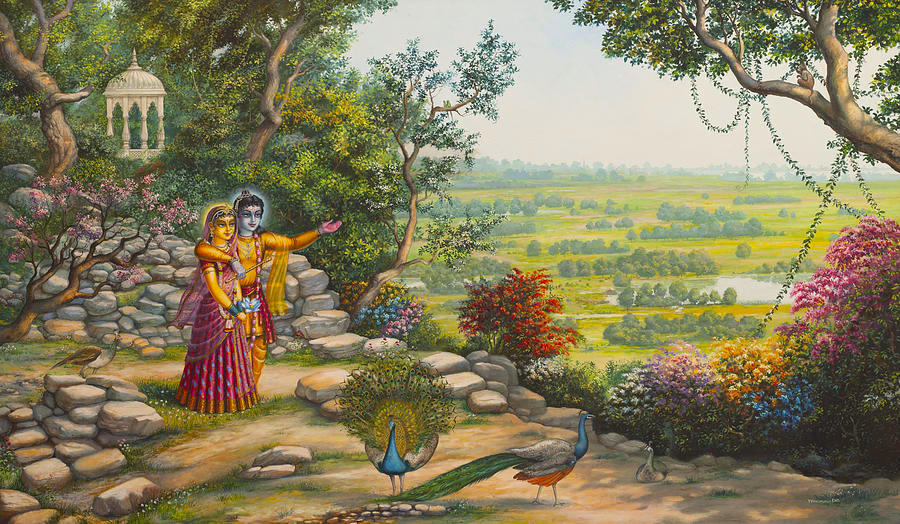
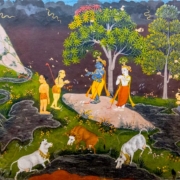
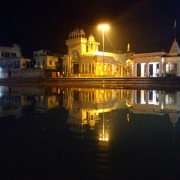

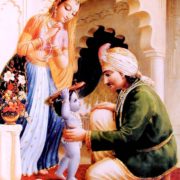
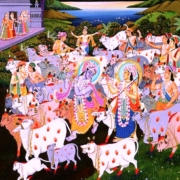

Leave a Reply
Want to join the discussion?Feel free to contribute!